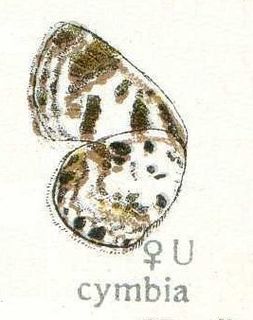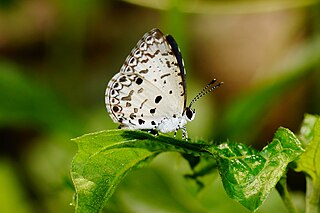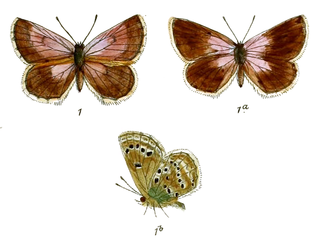
Zizina otis, the lesser grass blue, is a species of blue (Lycaenidae) butterfly found in south and southeast Asia. The species was first described by Johan Christian Fabricius in 1787. The lesser grass blue is often misidentified as Zizina labradus, the common grass blue.

Castalius rosimon, the common Pierrot, is a small butterfly found in India that belongs to the lycaenids, or blues family.

Tarucus theophrastus, the common tiger blue, pointed Pierrot or African Pierrot, is a small butterfly found in the Old World tropics. It belongs to the lycaenids or blues family.

Azanus jesous, the African babul blue or topaz-spotted blue, is a small butterfly found in Africa, Egypt, Syria, India, Sri Lanka and Myanmar that belongs to the lycaenids or blues family.

Niphanda cymbia, the pointed Pierrot, is a small butterfly found in northern India, Burma and northern Borneo that belongs to the lycaenids or blues family.

Megisba malaya, the Malayan, is a small butterfly found in South Asia and Southeast Asia. It belongs to the family of gossamer-winged butterflies (Lycaenidae). The species was first described by Thomas Horsfield in 1928.

Chilades lajus, the lime blue, is a small butterfly found in India, Sri Lanka, Myanmar, Taiwan, Hong Kong, Hainan, Mangulam Island, Sulawesi and the Philippines that belongs to the lycaenids or blues family.

Euchrysops cnejus, the gram blue, is a small butterfly that belongs to the lycaenids or blues family. It is found from India to Australia. The species was first described by Johan Christian Fabricius in 1798.

Anthene emolus, the ciliate blue, is a small butterfly found in India and southeast Asia that belongs to the lycaenids or blues family. The species was first described by Jean-Baptiste Godart in 1823.

Hampson's hedge blue is a small butterfly found in Sri Lanka, south India, Myanmar, and Laos that belongs to the lycaenids or blues family.

Callenya melaena, the metallic hedge blue, is a small butterfly found in India that belongs to the lycaenids or blues family.

Lycaenopsis marginata, the margined hedge blue, is a small butterfly found in India that belongs to the lycaenids or blues family.

Alpherakya devanica is a species of Lycaenid butterfly found in Asia.
Alpherakya sarta is a species of lycaenid butterfly found in Asia.

Nacaduba pactolus, the large four-line blue, is a species of lycaenid butterfly found in Indomalayan realm.

Nacaduba berenice, the rounded six-line blue, is a lycaenid butterfly found in Indomalayan realm. The species was first described by Gottlieb August Wilhelm Herrich-Schäffer in 1869.
Plebejus christophi, the small jewel blue, is a small butterfly found in Asia that belongs to the lycaenids or blues family.

Catochrysops strabo, the forget-me-not, is a small butterfly found in Asia that belongs to the lycaenids or blues family. The species was first described by Johan Christian Fabricius in 1793. It is found in Sri Lanka, India, from Sikkim to Indochina and in Sundaland, Sulawesi and the Philippines.

Catopyrops ancyra, or Felder's lineblue, is a species of butterfly belonging to the lycaenid family described by Cajetan Felder in 1860. It is found in the Indomalayan and Australasian realms.

Udara singalensis, the Singalese hedge blue, is a species of Lycaenidae butterfly. It is endemic to Sri Lanka.

















